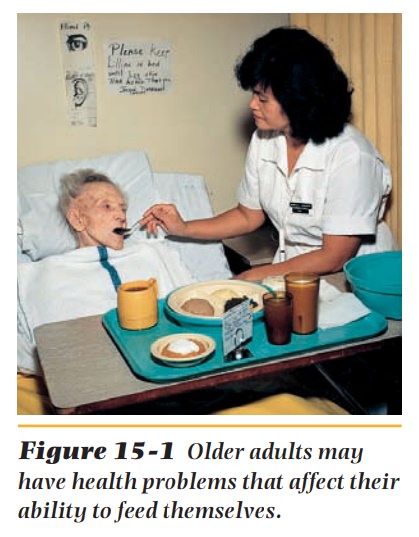Chapter: Nutrition and Diet Therapy: Diet During Late Adulthood
Food Habits During Late Adulthood
FOOD HABITS
If
the established food habits of the older person are poor, such habits will
undoubtedly have been a long time in the making. These habits will not be easy
to change. Poor food habits that begin during old age can also present
problems. Decreased income during retirement, lack of transportation, phys-ical
disability, and inadequate cooking facilities may cause difficulties in food
selection and preparation. Anorexia caused by grief, loneliness, boredom,
depression, or difficulty in chewing can decrease food consumption. Dementia
and Alzheimer’s may cause the elderly to think they have eaten when they may
not have.
Studies
indicate that many senior citizens consume diets deficient in protein; vitamins
C, D, B6, B12, and folate; and the minerals calcium,
zinc, iron, and sometimes calories.
An
elderly client’s diet plan should be based on MyPyramid and the nutrients
should be checked against the DRIs and AIs. Older persons’ needs can vary
considerably, depending on their conditions, so each person should be examined
by a physician to determine specific requirements. If the client consumes less
that 1,500 calories a day, a multivitamin-mineral supplement is recommended.
Variety and
nutrient-dense foods should be encouraged, as should water. Water is important
to help prevent constipation, to maintain urinary volume, to prevent
dehydration, and to prevent urinary tract infections (UTIs). When there is
serious protein and calorie malnutrition (PEM), the reason may be economic or
psychosocial. Elderly people who have long hospital stays can develop PEM in
the hospital. They may dislike the food, drugs may dull the appetite, and they
may be lonely and depressed. Sometimes poor or missingteeth can make eating
protein foods difficult (Figure 15-1). In such cases, protein-rich supplements
can be used.

If overweight is a
problem, it may be caused by overeating, lack of exer-cise, drugs, or alcohol.
Any adjustment in food
habits will require great tact, and plans for changes must be based on the
individual’s total situation.
Related Topics